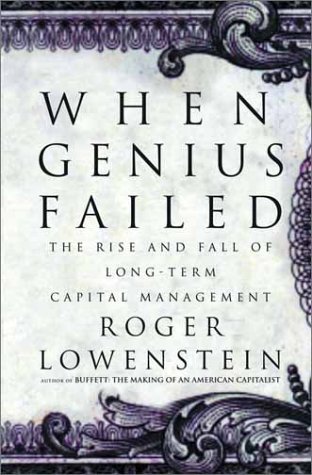More on this book
Community
Kindle Notes & Highlights
Scholes could not believe there were people who would not go to extremes to avoid paying taxes, perhaps because they did not fit the Chicago School model of human beings as economic robots.
“liquidity” is a straw man. Whenever markets plunge, investors are stunned to find that there are not enough buyers to go around. As Keynes observed, there cannot be “liquidity” for the community as a whole.6 The mistake is in thinking that markets have a duty to stay liquid or that buyers will always be present to accommodate sellers. The real culprit in 1994 was leverage. If you aren’t in debt, you can’t go broke and can’t be made to sell, in which case “liquidity” is irrelevant. But a leveraged firm may be forced to sell, lest fast-accumulating losses put it out of business. Leverage always
...more
At each infinitesimal moment, traders would readjust the price of options on IBM, keeping them in synchrony with the price of the stock. And traders who owned both could—by nimbly buying or selling—keep their portfolio in an Edenic, risk-free state of balance. In short, Merton assumed a perfect, risk-free arbitrage. This assumption may approximate real markets when they are calm—but only then. In 1987, so-called portfolio insurance was marketed (with absurd ballyhoo) to institutional investors as a technique of limiting losses via continuous selling when markets fall. These portfolio insurers
...more
As the English essayist G. K. Chesterton wrote, life is “a trap for logicians” because it is almost reasonable but not quite; it is usually sensible but occasionally otherwise: It looks just a little more mathematical and regular than it is; its exactitude is obvious, but its inexactitude is hidden; its wildness lies in wait.5
“You can overintellectualize these Greek letters,” Pflug reflected, referring to the alphas, betas, and gammas in the option trader’s argot. “One Greek word that ought to be in there is hubris.”
In times of trouble, markets become more closely linked, and seemingly unrelated assets rise and fall in tandem.
Markets can remain irrational longer than you can remain solvent. —JOHN MAYNARD KEYNES
Though it is seldom realized, a creditor is also beholden to his debtor.
Greenspan’s more serious and longer-running error has been to consistently shrug off the need for regulation and better disclosure with regard to derivative products. Deluded as to the banks’ ability to police themselves before the crisis, Greenspan called for a less burdensome regulatory regime barely six months after it.13 His Neolithic opposition to enhanced disclosure—which, because it allows investors to be their own watchdogs, is ever the best friend of free capital markets—served to remind one of the early Greenspan who (in thrall to Ayn Rand) once wrote, “The basis of regulation is
...more


